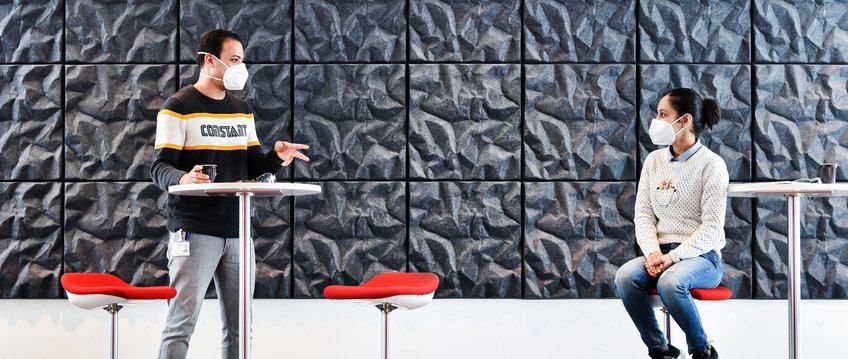
PhD Positions at the MPI KOFO
Discover new insights on your way to scientific independence
You are interested in chemical transformations and catalysis, and you would like to complete your doctorate in a collaborative and highly international research community? Apply for a PhD position at the Max-Planck-Institut für Kohlenforschung! The MPI Kofo is hiring year-round – see the job advertisements page or contact the director/group leader you would like to work with to enquire about opportunities.
The Max Planck Society is one of the leading research organizations, with over 85 institutes worldwide. The Max-Planck-Institut für Kohlenforschung shares its Mülheim campus with the Max Planck Institute for Chemical Energy Conversion, and focuses on chemical catalysis in all its aspects. The institute is home to leaders in the field or organic, inorganic, physical and theoretical chemistry, and has been a hub of innovation for over 100 years.
PhD students at the Max-Planck-Institut für Kohlenforschung are simultaneously affiliated with a German university which offers them a structured PhD curriculum. However, researchers spend most of their time at the MPI in Mülheim where they carry out their research, participate in group meetings, and attend trainings and seminars. PhD students at the institute generally complete their degrees within 3–4 years, depending on the nature of their project, and hold a paid position or fellowship throughout the duration of their program. PhD students employed by the Max-Planck-Institut für Kohlenforschung receive a salary equivalent to 66% of a TVöD E13 position, or are supported by external PhD fellowships.
Doctoral programs
The institute also participates in two international Max-Planck research schools (IMPRS), the IMPRS on Reactive Structure Analysis for Chemical Reactions (IMPRS RECHARGE), which focuses on research at the interface of chemistry and physics, and the International Max Planck Research School for Sustainable Metallurgy(IMPRS SusMet), focused on sustainable metallurgy.
All scientific discourse at the Max-Planck-Institut für Kohlenforschung is conducted in English, and all administrative communication is provided in German as well as English, so knowledge of the German language is not required, but good spoken and written English is necessary. Anyone interested in acquiring German language skills can profit from language courses offered at the institute, which are organized by the PhD representative.
Work in a town surrounded by nature in the middle of the Ruhr metro Area
Mülheim an der Ruhr is a town located in the west of Germany (~170,000 inhabitants), which is only a short train ride away from a number of larger cities (Essen and Duisburg: less than 10 min, Düsseldorf and Dortmund: about 30 min). In addition to many green spaces, Mülheim offers affordable housing and a comparatively low cost of living. To learn what it is like to be a PhD student at a Max Planck Institute, reach out to current PhD researchers via PhDnet! For more information specific to the MPI Kofo, you can contact our PhD representative.
PhD students who arrive with children or chose to start a family during their program can find more information on child care opportunities and family leave here.
The following short video by the Max Planck Society aimed at international applicants walks you through the process of becoming a PhD student at a Max Planck Institute:
The Max Planck Society is one of the leading research organizations, with over 85 institutes worldwide. However, our underlying application processes vary depending on the presence of one of our graduate schools.
